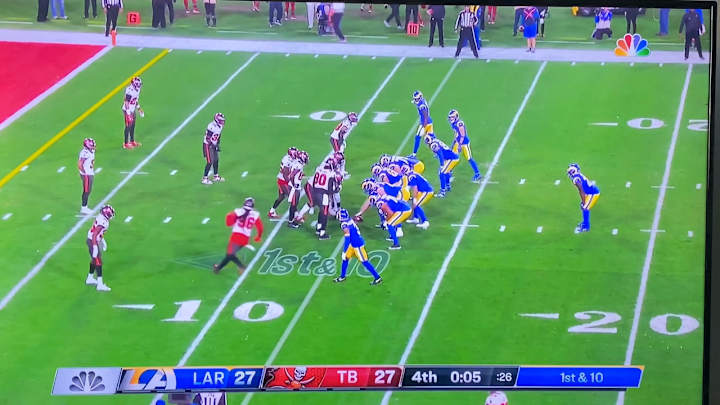BAD SPOT? Why'd Refs Spot Ball Quicker For Rams Than Cowboys?

It's little consolation to the Dallas Cowboys that - after a wild weekend of NFL Playoff upsets - Dak Prescott wound up winning the same number of Divisional Playoff games as Aaron Rodgers, Tom Brady and Josh Allen.
Because what happened at the end of last weekend's Wild Card loss to the 49ers remains a fresh wound. And what occurred on Sunday's penultimate play of the Rams' victory in Tampa spilled a vat of alcohol in it.
In case you forgot (but, seriously, how could you forget the Hail Nary?) the Cowboys were driving for a potential game-winning touchdown when Prescott slid at San Francisco's 24. But as the time wind down, Umpire Ramon George - after having to run 25 yards from behind the play - turned the finish into a circus, complete with bumping into Prescott, haphazardly spotting and then re-spotting the ball and, finally, letting the clock run out.
But before the Cowboys could commence the healing process, they were reminded of how a frantic, end-of-game officiating operation should work.
With :27 remaining in a tie game, Rams' quarterback Matthew Stafford hit Cooper Kupp for a 44-yard completion to Tampa's 12-yard line. As Stafford hurriedly got his offense lined up and readied to spike the ball and stop the clock for a game-winning field, the ball was spotted correctly and waiting for him.
Why? Because Back Judge Dino Paganelli had already spotted it and was backpedaling out of the way. Not until after Stafford successfully clocked it at :04 - to set up kicker Matt Gay's 30-yard game-winning field goal - did Umpire Terry Killens come jogging into the backfield.
Granted the Rams' 44-yard pass play was longer than Prescott's 17-yard run. But safe to say that if the officiating mechanics used in Arlington were in place Sunday in Tampa, time would have also ran out on Los Angeles.
Here’s the Rams spotting explanation from Blandino https://t.co/TLaLOLtKaI
— Shan Shariff (@1053SS) January 23, 2022
So, why were the two plays officiated so differently?
"Umpire is the primary for spotting the ball," Dean Blandino, the NFL's vice president of officiating from 2013-17, explained on Twitter. "But on a deep pass like that the Back Judge will spot the ball. Goal is to be as efficient as possible."
Again, the Cowboys admit they didn't lose to the 49ers because of one play. But if the NFL stands by its Cowboys-49ers end-of-game officiating being "efficient", the long, cold winter just got a little colder and a lot longer.

Richie Whitt has been a sports media fixture in Dallas-Fort Worth since graduating from UT-Arlington in 1986. His career is highlighted by successful stints in print (Fort Worth Star-Telegram, Dallas Observer), TV (NBC5) and radio (105.3 The Fan). During his almost 40-year tenure, he's blabbed and blogged on events ranging from Super Bowls to NBA Finals to World Series to Stanley Cups to Olympics to Wimbledons to World Cups. Whitt has been covering the NFL since 1989, and in 1993 authored The 'Boys Are Back, a book chronicling the Dallas Cowboys' run to Super Bowl XXVII.
Follow richiewhitt